 Petzlover
Petzlover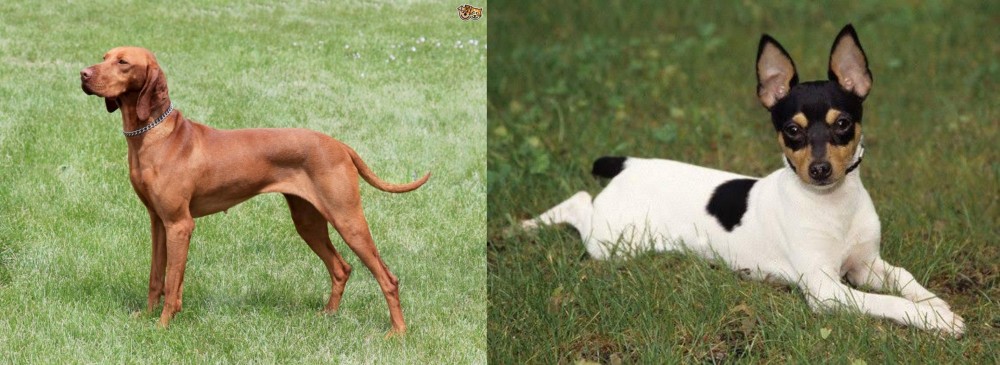 Hungarian Vizsla is originated from Hungary but Toy Fox Terrier is originated from United States. Hungarian Vizsla may grow 35 cm / 14 inches higher than Toy Fox Terrier. Hungarian Vizsla may weigh 26 kg / 58 pounds more than Toy Fox Terrier. Hungarian Vizsla may live 4 years less than Toy Fox Terrier. Both Hungarian Vizsla and Toy Fox Terrier has almost same litter size. Both Hungarian Vizsla and Toy Fox Terrier requires Low Maintenance.
Hungarian Vizsla is originated from Hungary but Toy Fox Terrier is originated from United States. Hungarian Vizsla may grow 35 cm / 14 inches higher than Toy Fox Terrier. Hungarian Vizsla may weigh 26 kg / 58 pounds more than Toy Fox Terrier. Hungarian Vizsla may live 4 years less than Toy Fox Terrier. Both Hungarian Vizsla and Toy Fox Terrier has almost same litter size. Both Hungarian Vizsla and Toy Fox Terrier requires Low Maintenance.
 The Hungarian Vizslas existed in the land that is now Hungary, the Pannonian Basin, at least since the 10th century when they were shown on etchings. It is thought that their descendants were various pointers, the extinct Turkish Yellow Dog and the Transylvanian Hound. The Vizsla is a hunting dog with the word being Hungarian for pointer. In 1937 the Carmelite Friars under orders from King Louis I of Hungry. The breed was isolated for centuries in the Basin by the aristocracy and land owners.
The Hungarian Vizslas existed in the land that is now Hungary, the Pannonian Basin, at least since the 10th century when they were shown on etchings. It is thought that their descendants were various pointers, the extinct Turkish Yellow Dog and the Transylvanian Hound. The Vizsla is a hunting dog with the word being Hungarian for pointer. In 1937 the Carmelite Friars under orders from King Louis I of Hungry. The breed was isolated for centuries in the Basin by the aristocracy and land owners.
The Magyar people of the area developed the breed for hunting as both pointers and retrievers. They were excellent at hunting rabbits and water fowl. With a terrific sense of smell and boundless stamina and energy, the were prized as family and companion dogs as well. This was unusual for a hunting or working dog. Their size made them appealing as well. They were small by comparison to other hunting dogs both pointers and retrievers.
Easy to train, the Hungarian Vizsla works in water, forests and fields. They are able to retrieve in the water as well as on the land. Throughout their history, the breed outlasted the Turkish Revolution, the Hungarian Revolution World War 1 and World War 2, as well as the Hungarian People’s Republic Communist State. Things were a little dicey for the Vizlas several times beginning in the 1800’s when German Shorthaired Pointers and English Pointers were introduced into the area. The next time was after World War II. Fearful of what this Communist state would mean for the breed, some were smuggled into the United States and Austria.
At that time there were only a dozen or so Vizslas in all of Hungary. Their numbers were brought back from that small breeding stock. This history did result in several different strains grew into their own breeding stock. There are Vizslas in Czechoslovakia, Romania, Serbia and Austria. There developed separate lines that became separate breeds in the Wirehaired Vizsla and the longhaired Vizsla which is very rare.
After World War II, the Hungarian Vizsla came to the United States and the Vizsla Club of American was established as a first step toward AKC (American Kennel Club) recognition. This was attained in 1960. Rex del Geisimino came to the U.S. in 1951 and he was able to respond to commands in both German and Hungarian. Vizslas also came to the United Kingdom in this time frame. There are now about 4500 registered with the KC (Kennel Club of Great Britain). A Vizsla won the distinctive Crufts Dog Show in Great Britain, as Best in Show.
It is believed that this gentle, sensitive and affectionate hunter was part of the original breeding stock or the Wirehaired Vizsla, the Weimaraner and the German Shorthaired Pointers. The Hungarian Vizsla is intelligent and social. The need your attention as well as a lot of exercise to avoid destructive behavior born of boredom. They want to be with you and they can be very protective of you.
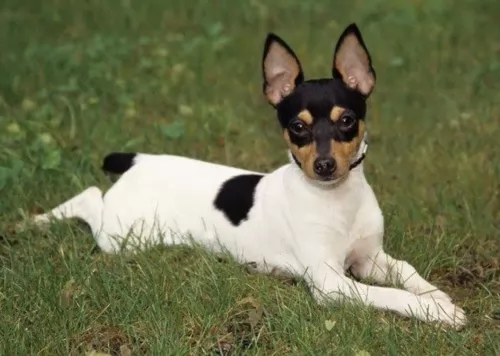 The small Toy Fox Terrier was developed in the United States of America and is a smaller look-alike of the larger Smooth Fox Terrier.
The small Toy Fox Terrier was developed in the United States of America and is a smaller look-alike of the larger Smooth Fox Terrier.
Several toy breeds as well as the Smooth Fox Terrier were used to bring about the small Terrier dog.
Small though they are, they have had a role to play, particularly on farms where they've been used as ratters. They’ve also been used in circuses to perform tricks. These days they excel as being devoted companions of their human masters. These dogs are recognized by the United Kennel Club (UKC).
 The Hungarian Vizsla has a light build, a short coat, and a distinctive bearing. They are medium in size and muscular, lean dogs looking a lot like the Weimaraner. They are also close in appearance to the Rhodesian Ridgeback and the Redbone Coonhounds. They are more muscular and leaner than the Rhodesian Ridgeback and Weimaraner.
The Hungarian Vizsla has a light build, a short coat, and a distinctive bearing. They are medium in size and muscular, lean dogs looking a lot like the Weimaraner. They are also close in appearance to the Rhodesian Ridgeback and the Redbone Coonhounds. They are more muscular and leaner than the Rhodesian Ridgeback and Weimaraner.
The Vizsla has a reddish nose and their nails and eyes should also be reddish or blending with the color of their coat. They have docked tails in the American standard but not in the United Kingdom, as docking is banned there. If he has a tail, you can see it flying through the air as he runs through the rough land to retrieve fowl.
They have a domed skull with a tapered muzzle that is shorter or equal to the skull. They have eyes that are contrasted with the coat and of medium size. The ears of silky, hang close to the face and the tips are rounded. The coat is rust in color with many shades. He also has a deep chest and hound like face.
 The Toy Fox Terrier stands at between 22 – 29cm in height and weighs between 1.5 and 4kg. He is squarely built, with alert, dark eyes, and large, erect ears.
The Toy Fox Terrier stands at between 22 – 29cm in height and weighs between 1.5 and 4kg. He is squarely built, with alert, dark eyes, and large, erect ears.
The high set tail is nearly always docked. The coat of this dog is short and smooth and it sheds moderately. Color is mostly white with tan or black markings. The face is nearly always black and tan.
His body is lean, lithe and muscular and gives the impression of being well-groomed. The females give birth to between 2 and 6 puppies with the gestation period being 60-64 days. Have your dog spayed to avoid unwanted puppies.
Toy Fox Terriers are loyal, protective dogs and they make excellent watchdogs in terms of barking a lot when needed.
He is such a sport and wants to be part of all the activities that his human family are busy with. They make great playmates for older children, but care should be taken with toy breeds and small, undisciplined children who could hurt them.
These dogs also get on well with other pets in the home and they can adapt easily to life in the city or the countryside. He isn’t the brightest dog, but intelligent enough to learn some basic commands.
His deep loyalty to his human family makes him a little bit aloof with strangers. While he is eager to please, he also has a mind of his own and this is when training and socialization turn him into an obedient little dog.
He has loads of energy too and will rely on his human owners to take him on walks and play ball games with him.
 Children friendliness - The Vizsla is very good with children.
Children friendliness - The Vizsla is very good with children.
Special talents - They are both excellent pointers and retrievers.
Adaptability - They are not very adaptable in living arrangements as they are much more suited for the country than the city.
Learning ability – The Vizsla is a very intelligent breed and easy to train. His learning ability is very high.
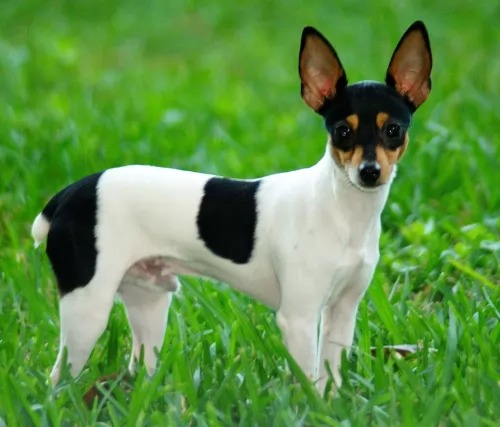 Small and spunky, the Toy Fox Terrier is such an entertaining little pet, full of beans and curiosity.
Small and spunky, the Toy Fox Terrier is such an entertaining little pet, full of beans and curiosity.
He has sharp eyes and his hearing is good and this makes him a good watchdog. He is independent and intelligent, playful and jaunty.
When you allow one of these little dogs into your home, you’ll wonder how you ever got by without one, as he promises to be loving and loyal throughout your friendship with him.
 The Hungarian Vizsla has a series of health issues that include:
The Hungarian Vizsla has a series of health issues that include:
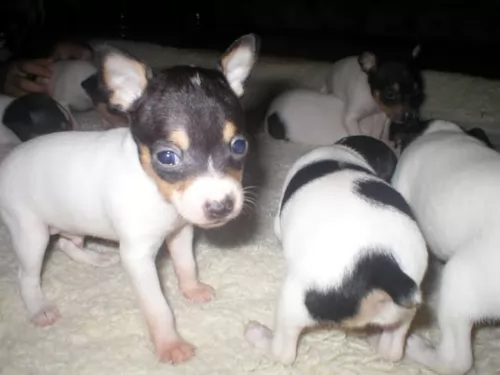 Toy Fox Terriers are generally healthy, but like all breeds, they're prone to certain health conditions.
Toy Fox Terriers are generally healthy, but like all breeds, they're prone to certain health conditions.
It is highly unlikely he’ll get any of the common dog illnesses there are if he is looked after well, but he could.
This is a common dog disease of small breeds, and it is very similar to hip dysplasia. Problems with the femur causes wear and tear with arthritis coming about as well.
 Feed two to four cups per day of a high quality dry dog food. Break this up into three or four meals. Don’t free feed your puppy.
Feed two to four cups per day of a high quality dry dog food. Break this up into three or four meals. Don’t free feed your puppy.
Feed two to three cups per day of high quality dry dog food. Feed in two servings.
The Vizsla is an athlete with high energy.
The Hungarian Vizsla needs at least 30 minutes of exercise every day and maybe more. He needs a large yard or open field, but daily brisk walks will do if that is all that is possible. He needs to be stimulated intellectually as well and enjoys fetch, jogging with you, lure coursing, field trials, tracking and scent work, confirmation, agility, barn hunt, dock diving, rally, and obedience.
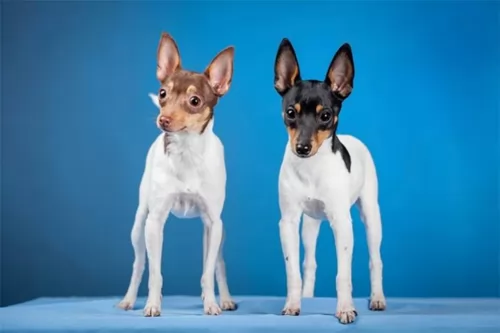 This little dog is essentially a companion. Just like people get these little dogs to be a companion, the dog also needs to receive proper care too.
This little dog is essentially a companion. Just like people get these little dogs to be a companion, the dog also needs to receive proper care too.
Make sure your pet gets the right amount of food and also the right type of food. He’ll need food rich in vitamins and minerals. He’ll also benefit from wholesome home-made food – boiled chicken, brown rice, sweet potato, spinach and carrots – simple, harmless foods like that.
Don’t be tempted to pop peanuts, chocolates, grapes, onions and other human foods into his mouth as it can give your pet a stomach ache and diarrhea.
Get your pet to the vet if he’s sick. He’ll need vaccines too to prevent some of the deadly canine diseases there are.
Provide your pet with adequate games and other forms of exercise. Exercise is essential for good health.
Spay or neuter your dog to avoid an unwanted litter of puppies. There are health benefits to having this done too.
Groom your small dog regularly and get rid of those loose hairs. With his short hair, the Toy Fox Terrier is considered to be a low maintenance dog.